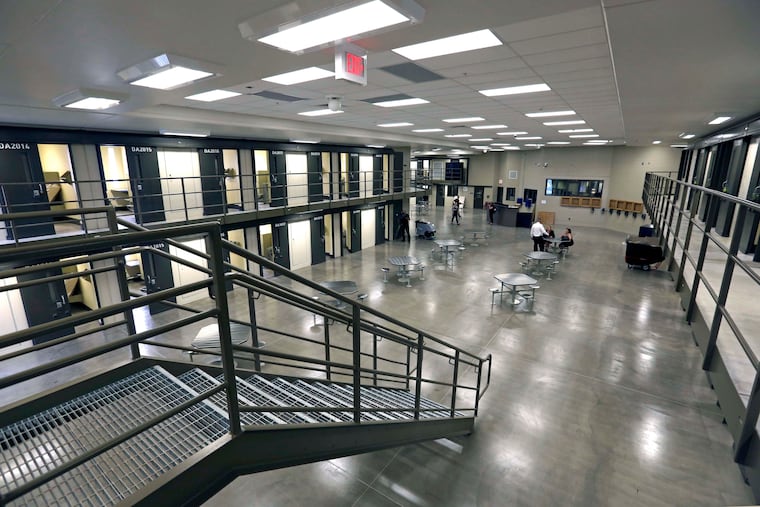Why are incarcerated people, the only Americans with guaranteed health care, dying of COVID-19 faster than the general public? | Opinion
There are moral, legal, and public health reasons to hold correctional officials accountable for the health care delivered to incarcerated populations.

People in U.S. federal and state prisons are more than twice as likely to die from COVID-19. This has been shown in not one, not two, but three separate studies, with the latest published in the Journal of the American Medical Association (JAMA) on Wednesday.
This disproportionate burden of COVID-19 among people who are incarcerated seems to be worse in Pennsylvania. The UCLA Law “COVID Behind Bars Data Project” estimates the COVID-19 death rate in the Pennsylvania Department of Corrections is almost twice as much as in the U.S. prison population.
Why do incarcerated people have worse health outcomes for COVID-19, despite being one of the only U.S. populations with a guaranteed right to health care? The answer lies in the long-standing lack of regulation of correctional health care. The COVID-19 pandemic has revealed how these shortcomings in how health care is overseen in prisons and jails can have fatal consequences.
» READ MORE: COVID-19 imposes a new death sentence in Pa. prisons | Editorial
Approximately 2,700 people have died from COVID-19 while in custody. But people who are incarcerated and die in outside hospitals due to COVID-19 are not included in counts of COVID-19 fatalities by correctional officials. Due to these inconsistencies in diagnosing and reporting, hospital deaths attributable to COVID-19 in our nation’s prisons, jails, and immigration detention centers are likely much, much higher.
There are moral, legal, and public health reasons to hold correctional officials accountable for the health care delivered to incarcerated populations. Prisoners are a vulnerable population because their lack of autonomy compromises their ability to make informed and voluntary decisions about their own health. In 1976, the Supreme Court held that justice-involved individuals have the right to adequate medical care while incarcerated. What is happening inside jails and prisons during the pandemic is also affecting the larger community: Individuals cycling through the Cook County Jail led to additional COVID-19 cases in their zip code of residence and accounted for 21% of racial COVID-19 disparities in Chicago.
In 1994, the Supreme Court established that “deliberate indifference” to an incarcerated person’s serious medical needs constituted a violation of the Eighth Amendment’s cruel and unusual punishment clause. “Deliberate indifference” is defined as the knowledge and reckless disregard of a substantial risk of harm to the person who is incarcerated. However, how deliberate indifference is evaluated remains vague. What also remains unclear is who is being deliberately indifferent. Is it the correctional officer who lacks adequate medical training? Is it the medical director who works within a system with limited resources? At what point are the policymakers responsible for being deliberately indifferent? Protection of the established right of people to health care requires resources for both enforcement and accountability.
These repeated studies describing gross disparities in COVID-19 mortality between people who are incarcerated and the general U.S. population remind us that, despite the constitutionally ensured right to health care, there remains little regulation over how this right is implemented across jails and prisons. Current accreditation guidelines from the American Correctional Association (ACA) and the National Commission on Correctional Health Care (NHCC) provide a framework for transferring people who are incarcerated to hospitals for acute treatment, but accreditation is completely voluntary. Of the 7,147 adult correctional institutions in the United States, only 574 are accredited by the ACA. This means that we do not know how more than 90% of these facilities are handling the acute health-care needs of people who are incarcerated.
Now the COVID-19 pandemic has shed a bright light on both egregious violations of human rights as well as long-standing inadequacies in hospital care for people who are incarcerated.
What should be done? Professional organizations, policymakers, regulators, and correctional officials all have a role to play. For starters, organizations such as the ACA and NHCC should more clearly define what constitutes timely and efficient access to acute hospital care. Guidelines should specify the window of time in which correctional officers and medical staff must respond to formal complaints made by people who are incarcerated. Moreover, guidelines should ensure that safety measures used by correctional staff during transportation to hospitals, such as restraints and isolation, do not compromise the health and well-being of those incarcerated.
Regulators should consider making compliance with guidelines mandatory or providing strong financial incentives for institutions to meet accreditation standards. Policymakers must ensure that correctional institutions have adequate resources to provide timely and efficient access to hospital care and that policies are adapted to how health care is delivered across jurisdictions and types of correctional settings. Ultimately, everyone involved in health-care decision-making for people who are incarcerated must come to the table to create a self-regulating system of checks and balances. The legal, moral, and public health imperatives are clear. Now so is the evidence.
Daniel Teixeira da Silva is an associate fellow of the Leonard Davis Institute of Health Economics and a fellow of the National Clinician Scholars Program at the University of Pennsylvania. Kayla McLymont is a researcher with the Addiction, Health & Adolescence Lab at the University of Pennsylvania and an undergraduate student at Brown University.